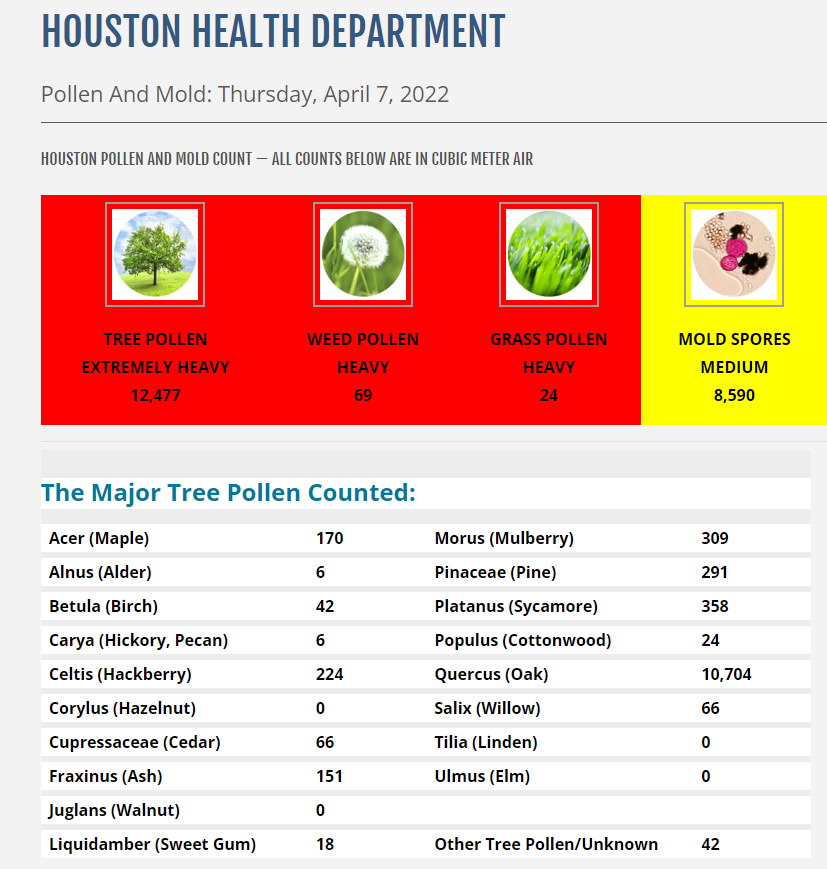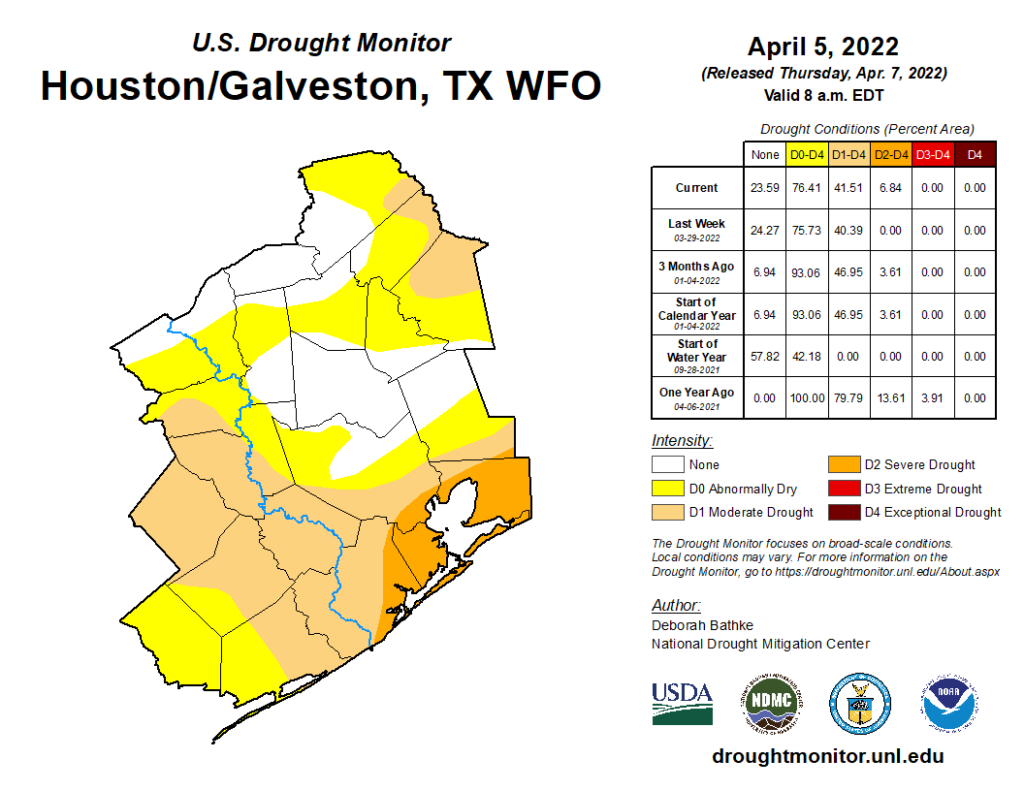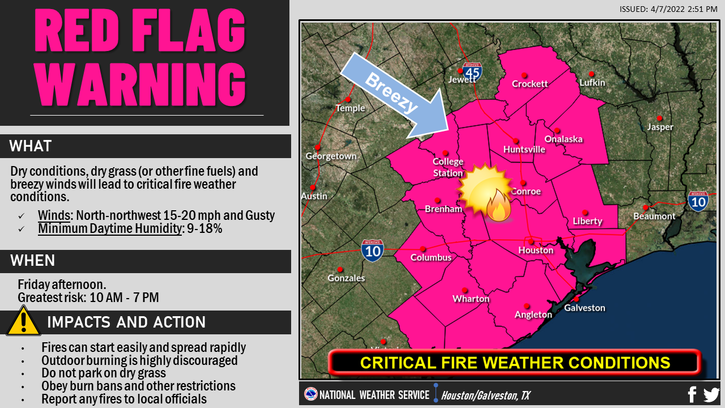So, last Friday I noted how Houston’s pollen season had probably been in the process of peaking, slightly later than usual. The last two days laughed in the face of that comment and produced the highest tree pollen values I can find in the City of Houston’s pollen count archives (2013-2022), with values over 10,000 Wednesday and over 12,000 yesterday. Going back to 2013, there is not a remotely comparable day in Houston in terms of tree pollen, specifically oak pollen. The next closest value I can find is 6,440 on March 21, 2019. Keep in mind that pollen counts are not conducted on weekends and holidays, so there is missing data, but the odds of all the maximum days not showing up over 9 years of data is quite low.

So then, what is it? Why is this year so much worse than any recent year? There are two theories I have, neither of which I can definitively back up. The first is the drought over Texas. Since February 1st, we’ve had 3 days of rainfall over a quarter inch at Hobby Airport. Since 2000, we’ve averaged six of them. More on drought in a second, but in general rain does help wash some of this pollen away. The dryness, combined with the breezy conditions we’ve had, is just a brutal recipe right now. I’m also guessing that a lot of pollen from central Texas has found its way to Houston with those gusty winds too, as drought is much worse there.
My second theory is that the latest freeze in Houston since 1999 may also be playing a role here. We had a mid-March pair of freezing nights, and I’m wondering if that may have delayed the onset of the excessive pollen, meaning the oak pollen season is delayed. Normally we would be declining by now, but we may be at peak instead.
So my theory is that the dry and windy spring are making the season more extreme, and the later than usual freeze has made it peak later. I may be wrong here, and I would love to be corrected by a tree or pollen expert if so. Hopefully by this time next week, we’re discussing more manageable pollen levels.
Dry, dry, dry
Speaking of drought, the new drought monitor map came out yesterday, which shows that drought coverage in the Houston area inched up just a bit, primarily in Galveston, Chambers, and Brazoria Counties. Texas as a whole did just a bit better week over week.

Rainfall over the next two weeks looks to be near average in the Houston area and below average in the rest of Texas. Drought should hold or worsen statewide.
Red flag warnings are posted for today across all of southeast Texas into southern Louisiana. A red flag warning means that there is very high fire danger due to wind and low humidity levels. Dry brush and grass certainly is not helping.

Basically, use common sense today. Outdoor burning is discouraged. Don’t park on dry grass. Don’t discard cigarette butts out the car window. And if you see any sort of grass fire, report it right away before it can cause bigger problems. As of Thursday evening there were 48 active wildfires across Texas, according to the Texas Wildfire Incident Response System.
Weekend forecast
So that was a lengthy intro to today’s post! Why? There’s not much happening outside of that. Look for a sunny Friday, Saturday, and probably Sunday too. Winds will be gusty today with highs well into the 70s. Tomorrow should see lighter winds with morning lows in the 50s and daytime highs in the lower 80s. Sunday will see a shift to onshore, southerly winds and they could be strong at times, gusting up over 25 mph. Highs will be in the low 80s after morning lows in the low 60s. Humidity will start to become noticeable by later Sunday.
Next week
That onshore flow and building humidity will lead to more clouds than sun and perhaps a shower on Monday. We should still manage the low-80s, but morning lows will struggle to get below 70 degrees. Winds will be gusty again Monday also. Tuesday and Wednesday should see a chance of showers and thunderstorms, along with continued breezy conditions and warm, humid temperatures. We may or may not get a cold front through here later Wednesday or early Thursday, as modeling has been bouncing all over the place on that. If that happens, look for cooler, drier air for the end of next week. We’ll update you with the latest on Monday.
I’ve observed all vegetation is running late this year by at least 2 weeks. I think plants “remember” they came out too early and the February freeze killed many of them in 2021.
None of the crepe myrtles in my neighborhood are out yet.
You also know you are in trouble when a yard guy is blowing up a green cloud with his industrial strength blower.
Leaf blowers: One of mankind’s worst inventions ever. Especially the gas powered versions.
Re Oak pollen. You want to see high oak pollen, look at 2012, the year after the 2011 drought and heatpocalypse. The trees “thought” they were gonna die and produced unbelievable pollen. You looked down the street at oak trees, a puff of wind, and huge yellow cloud of pollen. Check it out.
The theory of the wind seems the best. Here is the southern Rockies the Juniper pollen has been terrible but we are still in the twenties at night and the winds have been bad even by typical standards. I’m suffering long distance with my family back in Houston, misery loves company, right?
Leroi in his comment backs up what my botanist wife believes. When plants are threatened by drought, they usually produce more pollen to increase their survival as a species.
The spring winds of 2019, 2020, 2021, 2022 have increased in frequency. Base this on how much yard debris I pick up, sweep up with my trusty broom, pull out of pool, and flush out of DE filter. Matt, does any of your collected data support my observation?
What’s with all the wind lately? It seems like a lot more than I remember from previous years.
It sure seems to me that the record hot December moved winter a month later than usual.
Matt, thanks for the very informative (as always) weather news, specifically the pollen stats and theories. I also have a minor theory that may add a little more to the discussion. Many plants, when stressed with conditions like drought, severe wind or extreme temperatures, go on a spectacular procreation spree. I assume it’s because they sense that their death is likely to happen under adverse conditions. I don’t know if trees also react in this manner, like, for instance, poinsettias do, but it wouldn’t surprise me if it were a factor. The more I learn about trees, the more of a tree-hugger I become! Thanks so much to you and to Eric. I trust and appreciate your weather science made accessible without any hype. You both come across as a smart neighbor who’d be fun to have a cup of coffee with. Be well! Lynn McCue
Others have similar theory to yours re pollen uptick this year